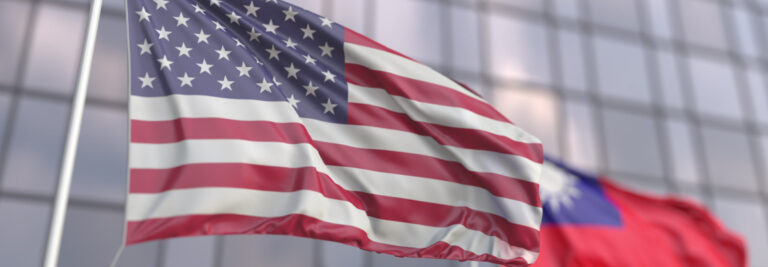An announcement by Chinese authorities on February 26 that China would be banning all imports of Taiwanese pineapples beginning March 1 due to the discovery of “quarantine pests” sparked a new row in cross-Strait relations, leading to accusations on the Taiwanese side that Beijing is once again weaponizing trade to serve its political objectives. From the outset, very few people in Taiwan believed the claims by the State Council’s Taiwan Affairs Office (TAO, 國務院臺灣事務辦公室). This skepticism stemmed largely from the fact that, over the years, Beijing authorities have repeatedly exploited both the denial and promises of trade for political reasons (a tactic that can be described as “coercive trade”). Since 2016, China has utilized trade denial to undermine the Democratic Progressive Party (DPP, 民主進步黨)-run central government under Tsai Ing-wen (蔡英文), presumably in retaliation over her administration’s refusal to recognize the so-called “1992 Consensus” (九二共識).
A Long History of “Coercive Trade”
Soon after President Tsai’s election in January 2016, the Chinese government reduced the number of Chinese nationals who were allowed to come to Taiwan as part of tour groups by as much as 30 percent from the same period in the previous year, when the more China-friendly Ma Ying-jeou (馬英九) of the Kuomintang (KMT, 中國國民黨) was in office. With this initial move, Beijing seemed intent on hurting an important sector of Taiwan’s economy—one that had become over-reliant on a seemingly endless supply of tourists from China—and using the resulting economic pain to exert political pressure on the Tsai administration to recognize the “1992 Consensus.” In an attempt to divide Taiwanese society, Beijing calibrated its strategy so that municipalities that were governed by KMT politicians would continue to receive large numbers of tourists, while those that were headed by the DPP would be targeted for reductions. Although thousands of tour operators took to the streets in protest in the middle of 2016, the demonstrations soon fizzled out, frustrating Beijing’s efforts. Moreover, the pressure on the sector compelled the Taiwanese government to redouble its efforts to diversify its sources of tourists, a strategy that not only succeeded but which in subsequent years led to record-breaking numbers of arrivals—including from countries falling under Tsai’s New Southbound Policy (新南向政策). As cross-Strait relations continued to sour in 2019, Beijing once again resorted to tourism denial to pressure the Tsai administration, this time by cutting down on the number of individual (and often wealthier) Chinese tourists allowed to visit Taiwan.
The weaponization of tourism had first been employed during the Ma administration, but was normally applied as a way to punish DPP politicians at the local level rather than the overall sector, where Beijing hoped to cultivate over-reliance so as to turn it into a leverage tool. In 2009, for example, the Chinese government used such tactics—as well as the cancellation of hotel reservations by Chinese tour groups—to pressure the government of Kaohsiung to cancel the screening of a documentary about World Uyghur Congress President Rebiya Kadeer. Also in 2009, China sent purchasing delegations to Taiwan to “reward” the Ma government and incentivize various sectors of the Taiwanese economy. In 2012, Beijing again used trade incentives—this time the import of large quantities of milkfish—in an attempt to encourage voters to re-elect Ma to a second term.
Join the Club
Skepticism over the TAO’s claim that inspectors had found bugs in Taiwanese pineapples was also reinforced by a series of similar incidents involving other countries in recent years. In 2012, as the territorial dispute between China and the Philippines deepened, China halted the import of bananas from the Philippines due to the alleged discovery of mealybugs in dozens of containers. Amid a diplomatic row with Australia in 2020, Beijing suspended imports of Australian barley after China claimed shipments “did not meet phytosanitary requirements” (Australian grain handler CBH said the claims were bogus). Later that same year, China escalated this approach by targeting the import of Australian wine. Australian lobster, sugar, coal, timber, wool, and copper ore were also unofficially suspended, potentially costing the Australian economy losses in the billions of Australian dollars.
China has also used economic coercion to ban imports of oilseeds from Canada after inspectors reportedly discovered “harmful organisms” in samples. At the time, the two countries were locked in a dispute over the 2018 detention by Canadian authorities and possible extradition to the US of Huawei CFO Meng Wanzhou (孟晚舟) and the retaliatory kidnapping of Canadian nationals Michael Spavor and Michael Kovrig. The move against oilseeds followed a suspension of imports of Canadian beef and pork by Beijing due to alleged “forged health certificates.” Also in 2020, Chinese importers canceled orders worth $23.8 million from Czech piano producer Petrof following a high-profile visit to Taiwan by Czech senate speaker Miloš Vystrčil. In 2017, China retaliated against the deployment of a THAAD defense system in South Korea by ordering a sharp decline in the number of Chinese tourists and shutting down almost two dozen retail stores operated by South Korea’s Lotte Group.
The Politics of Coercive Trade
As Taiwanese reacted to the pineapple ban, the controversial Global Times Editor-in-Chief Hu Xijin (胡錫進) remarked on Twitter that the move was “a tiny issue” and “only a quarantine step,” which the Tsai government was politicizing for domestic gain. Inasmuch as Hu’s posts can be construed as official Beijing policy, his comments suggest that Chinese officials are sticking to the claim that the ban was purely a matter of public health. Later, in a post on Weibo, Hu hinted that China had the means to cause much more harm to Taiwanese farmers if it so chose, suggesting that coercive trade was very much what had driven the ban on pineapples to begin with.
It should also be pointed out that the main pineapple-producing municipalities in Taiwan all happen to be governed by DPP politicians. Notably, all Taiwanese mayors will be up for re-election in next year’s nationwide local elections. The ban also occurred amid a war of words between the TAO and the recently appointed head of the Mainland Affairs Council (MAC, 大陸委員會), Chiu Tai-san (邱太三) over the “1992 Consensus” and as Beijing continues to ramp up its pressure on the Tsai administration.
Opposition KMT politicians also jumped on the opportunity to criticize the Tsai government and in doing so seemed to contradict Beijing’s claim that the ban was unrelated to politics. Besides calls by the blue camp for President Tsai to apologize to Taiwanese pineapple farmers for their predicament, KMT Legislator Lee De-wei (李德維) opined that Taiwanese pineapple farmers who voted for the DPP should think twice about the consequences of their voting decisions. Lee added that nobody should be surprised by China’s retaliation, as Taiwan had continually rejected China—including its COVID-19 vaccine. After initially thanking Beijing for helping Taiwan identify “bugs” in its pineapple products, KMT Chairman Johnny Chiang (江啟臣) said the two sides should not politicize the issue and should instead find pragmatic ways to resolve the dispute. Pointing out that China is the largest market for the export of Taiwanese fruit, Chiang then questioned the Tsai administration’s ability to diversify its export market, as well as the achievements of the New Southbound Policy. For his part, TV personality Jaw Shaw-kong (趙少康)—who recently rejoined the KMT and will reportedly seek the party’s nomination for the 2024 presidential elections—warned of a possible “trade war” between the two sides and blamed the situation on the Tsai administration’s policies, which he argued can only hurt farmers.
Blowback
Overall, China’s efforts to engage in coercive trade to further its political aims appear to have failed. Besides alienating countries like Australia and Canada, its belligerent attitude has resulted in greater awareness of Beijing’s “wolf warrior diplomacy” and increased worldwide solidarity, with many countries helping to make up for China’s retaliatory measures by increasing orders of the targeted products. In Taiwan, the targeting of vulnerable sectors of Taiwan’s economy has failed to coerce the Tsai administration, to translate into bottom-up discontent toward the central government, or to effectively exert pressure for the re-recognition of the “1992 Consensus.” Within 96 hours, various campaigns encouraging Taiwanese to purchase pineapples, as well as large orders by convenience stores, had more than compensated for the loss of exports to China (exported pineapples account for about 10 percent of total annual sales, with most exports going to China). The weaponization of trade also appears to have convinced most Taiwanese that Beijing has abandoned its goal of winning their hearts and minds, and that it has no compunction about hurting the livelihood of the “compatriots” whom the CCP purports to care for and represent.
In addition to likely violations of WTO rules (some countries like South Korea have sought arbitration at the global trade body), China’s coercive trade practices have led to a reckoning, as many countries have recognized the need to diversify their trade and reduce their reliance on the increasingly unpredictable (and unreliable) Chinese market. With tourism serving as an example, rather than intimidate Taiwan into submission, such practices have instead created the incentive for diversification—in other words, the very opposite of the economic over-dependence which would give Beijing greater leverage over Taiwan. As the list of countries victimized by China’s coercive trade continues to grow, so too does the spirit of solidarity among those affected by this practice. While relatively minor, the pineapple incident has again increased Taiwan’s global profile. At this point, leaders and civil society in Taiwan and in other countries should come together and create a platform through which countries can assist each other by increasing orders whenever one member is the victim of retaliatory measures by China (already, countries like Japan and Australia, as we have seen, have ramped up purchases of pineapples to help Taiwan). In so doing, members of this “club” could help reduce the effectiveness of Beijing’s coercive trade policy and perhaps—jointly with action at the WTO—convince Chinese leadership to abandon the practice altogether.
The main point: For many years, China has used trade as a weapon to further its political objectives. A recent controversy over the ban of imports of “tainted” pineapples from Taiwan has backfired by encouraging solidarity and increasing Taiwan’s visibility on the international stage.



